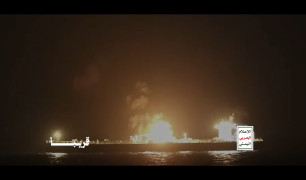كلمة مرتقبة للسيد القائد عبدالملك بدرالدين الحوثي تهيئة لشهر رمضان المبارك
مصادر فلسطينية: سقوط 54 مصابا في اعتداء مستوطنين وقوات العدو على فلسطينيين في بلدة تلفيت بقضاء نابلس
مصادر فلسطينية: عشرات الفلسطينيين يُجبرون على النزوح قسراً من خربة الميتة بالأغوار الشمالية، إثر هجمات لمغتصبين صهاينة شملت إحراق المنازل والخيام
الهلال الأحمر الفلسطيني : 3 مصابين في هجوم للمغتصبين على مزارعين في تلفيت بنابلس
مصادر فلسطينية: عائلات بدوية فلسطينية تفكك مساكنها وتغادر الأغوار تحت ضغط اعتداءات المغتصبين
أمين المجلس الأعلى للأمن القومي: سنرد بشكل قوي وقاطع ومناسب على أي مغامرة تستهدف إيران، والكيان الصهيوني لن يتحرك دون دعم أميركي مباشر
أمين المجلس الأعلى للأمن القومي علي شمخاني : تكلفة أي خطأ في الحسابات ستكون مرتفعة، وتجنب أي تحركات تمس باستقرار المنطقة هو المسار العقلاني لجميع الأطراف
مصادر فلسطينية: إصابات بالاختناق في بلدة تلفيت بقضاء نابلس شمالي الضفة الغربية
مصادر فلسطينية: شهيد برصاص العدو في منطقة الزرقاء شرق مدينة غزة، ليرتفع عدد الشهداء منذ صباح اليوم إلى 3 شهداء
رويترز: استقالة وزير شؤون مجلس الوزراء البريطاني كريس وورمالد وسط تداعيات قضية المجرم "إبستين"








































































